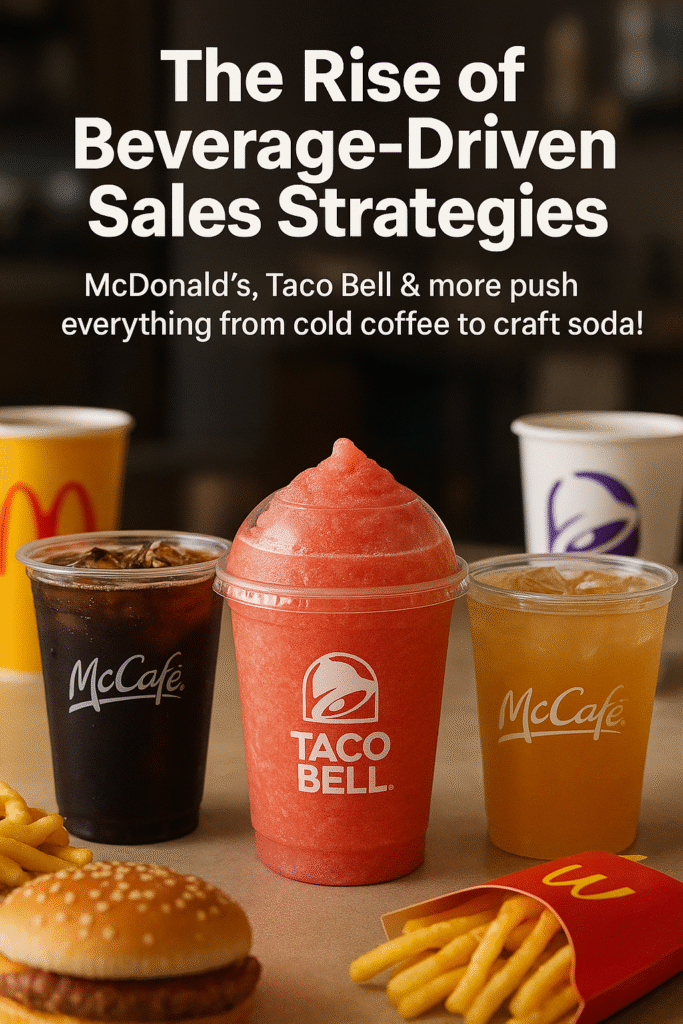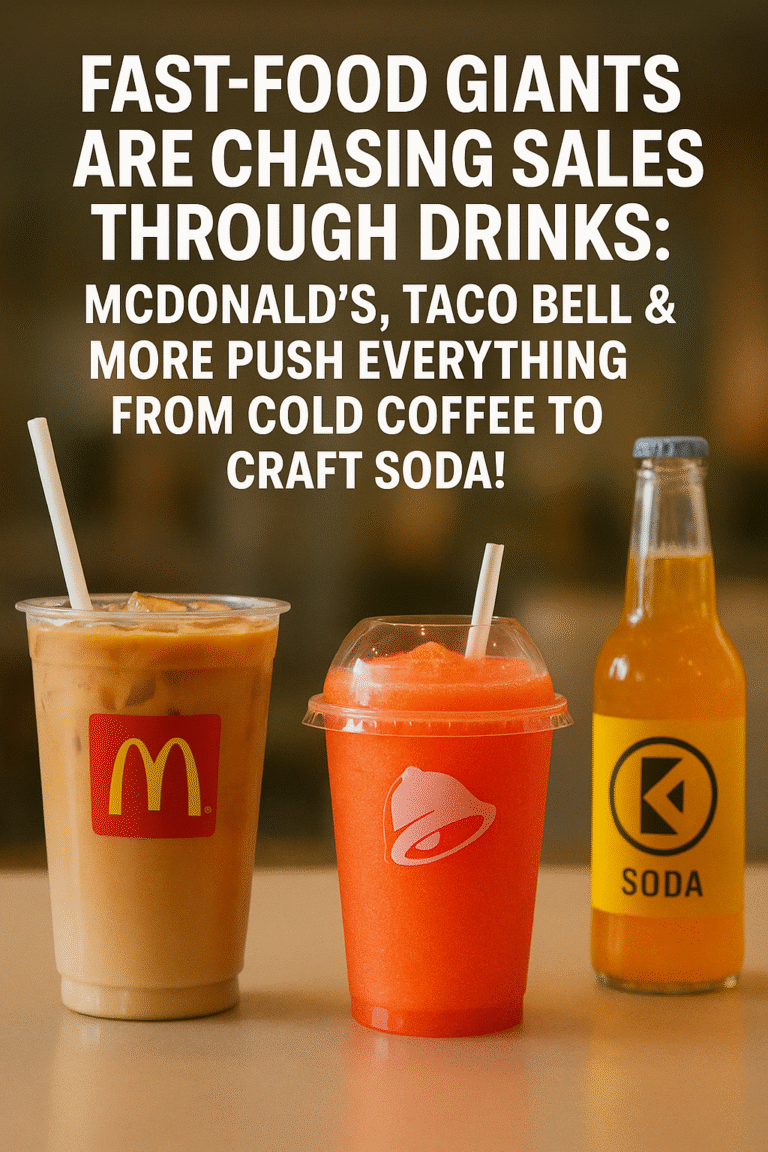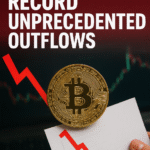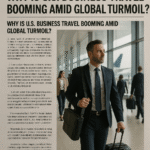Premium Biz Post – In today’s ever-changing food and beverage landscape, fast-food giants are chasing sales through drinks: McDonald’s, Taco Bell & more push everything from cold coffee to craft soda! This shift is not just about quenching thirst—it’s about tapping into new consumer trends, driving higher profit margins, and staying relevant in a hyper-competitive market. With evolving customer demands, drinks are no longer an afterthought but a central strategy for fast-food chains worldwide.
The Rise of Beverage-Driven Sales Strategies
Traditionally, fast-food restaurants relied heavily on burgers, fries, tacos, and fried chicken as their main revenue sources. However, as consumer habits have changed, drinks have become a goldmine for the industry. From iced coffee and bubble tea to premium lemonades and craft sodas, beverages now represent one of the fastest-growing product categories in the quick-service restaurant (QSR) sector.
One reason is profitability. Drinks often carry a significantly higher margin compared to food items. A cup of cold brew or flavored soda costs little to produce but can be sold at premium prices, making them a lucrative addition to fast-food menus. Moreover, drinks appeal to health-conscious, adventurous, and younger consumers who are seeking unique flavors and Instagram-worthy moments.

McDonald’s: From Dollar Drinks to Global Beverage Expansion
No discussion about fast-food beverage innovation would be complete without McDonald’s. Long known for its “Dollar Drink” promotions, the chain has evolved into a powerhouse in the beverage category. The McCafé line of iced coffee, frappes, and specialty drinks has given McDonald’s an entirely new way to compete—not just against Burger King or Wendy’s, but against coffeehouse chains like Starbucks and Dunkin’.
In 2025, McDonald’s is expanding cold brew and seasonal specialty lattes to more international markets. By combining affordability with café-style offerings, the brand has carved out a profitable niche that keeps both morning commuters and younger coffee lovers coming back. This strategy highlights how beverages can transform a traditional fast-food model into a more versatile dining experience.
Taco Bell: Breaking the Mold with Frozen Drinks
Taco Bell has always thrived on innovation and creativity, and its beverage strategy is no different. The chain is well known for its frozen drink lineup, particularly the Mountain Dew Baja Blast Freeze, which has developed a cult following over the years. Limited-time beverage flavors, colorful frozen concoctions, and collaborations with soda brands keep Taco Bell ahead of the curve when it comes to appealing to Gen Z and millennials.
The brand understands that its core audience is not only looking for affordable meals but also bold, fun, and highly shareable experiences. That’s why Taco Bell beverages are often bright, Instagram-ready, and packed with flavor. By leaning heavily on limited editions and exclusivity, Taco Bell drives traffic and encourages repeat visits.
Beyond McDonald’s and Taco Bell: A Wider Fast-Food Beverage Revolution
While McDonald’s and Taco Bell are leading the charge, they are not alone. Other fast-food chains are increasingly recognizing the power of beverages:
- Burger King has expanded its frozen and iced coffee selections, aiming to compete directly with McDonald’s McCafé line.
- Wendy’s has invested in unique lemonade flavors, from strawberry to pineapple mango, which have become customer favorites.
- Chick-fil-A consistently promotes its hand-squeezed lemonade and seasonal milkshakes, driving customer loyalty through signature drinks.
- Starbucks (though not traditionally “fast food”) continues to influence the QSR drink market, inspiring fast-food chains to replicate its seasonal marketing model.
These moves demonstrate that drinks are no longer a secondary category. Instead, beverages are central to branding, customer engagement, and revenue growth.
Why Drinks Work: Psychology, Margins, and Lifestyle
The reason fast-food giants are chasing sales through drinks: McDonald’s, Taco Bell & more push everything from cold coffee to craft soda! lies in the unique position beverages occupy in consumer psychology. Drinks are an affordable indulgence. A customer might hesitate to spend $10 on a full meal but won’t think twice about buying a $3 iced coffee or $2 specialty soda.
Furthermore, beverages are tied to lifestyle choices. Coffee lovers often identify with specific brands, while soda enthusiasts crave seasonal or exclusive flavors. Younger consumers, in particular, see beverages as a form of self-expression, similar to fashion or music. By catering to this mindset, fast-food chains are building stronger emotional connections with their audience.
The Role of Technology in Beverage Innovation
Technology is another driver behind this beverage boom. Fast-food apps and digital loyalty programs often highlight limited-time drinks or reward customers with free beverages after multiple purchases. This creates a sense of urgency while ensuring repeat business.
For example, McDonald’s mobile app frequently features “Buy One, Get One Free” offers on iced coffees, while Taco Bell promotes its new frozen drinks through app-exclusive deals. These digital marketing strategies help boost beverage sales while also collecting valuable customer data.
read more : “DIY Coconut Shells Beautiful Home Decor from Natural Materials“
Health-Conscious Options Enter the Scene
With rising health awareness, fast-food chains are also diversifying their drink offerings. While traditional sodas remain popular, many consumers are shifting toward low-sugar, plant-based, or natural alternatives.
Brands have responded with:
- Sparkling waters with natural fruit flavors.
- Reduced-sugar lemonades and teas.
- Cold-pressed juices and kombucha-inspired beverages.
This shift allows Fast-Food Giants chains to cater to both indulgent and health-conscious customers without alienating either group.
Challenges Ahead for Beverage-Focused Strategies
Despite the success, the beverage boom is not without challenges. The market is becoming increasingly crowded, and not every drink innovation resonates with consumers. Flop flavors, overly complex recipes, or poorly timed launches can lead to wasted investments.
Additionally, concerns around sugar consumption, environmental impact from single-use cups, and competition from coffee chains could limit long-term growth. To succeed, fast-food giants must balance indulgence with responsibility, innovation with consistency, and mass appeal with uniqueness.
The Future of Fast-Food Drinks
Looking ahead, the beverage category will likely become even more experimental. Expect to see:
- Functional beverages with added vitamins, adaptogens, or probiotics.
- Seasonal exclusives that mirror Starbucks’ success with its Pumpkin Spice Latte.
- Cross-brand collaborations where fast-food chains team up with soda companies or even alcohol brands to create unique drink experiences.
- Sustainable packaging innovations to meet growing consumer demands for eco-friendly solutions.
This evolution means that drinks will continue to shape not only menus but also brand identity and marketing strategies for years to come.



